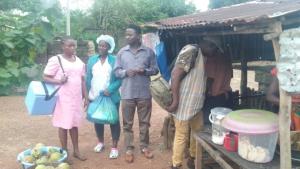Helinda’s commitment: A nurse’s frontline role in Sierra Leone’s mpox response
Pujehun District, Sierra Leone – August 2025
Helinda Saffiatu Sandi is no stranger to the challenges of public health service delivery. At 37 years old, the trained nurse from Pujehun Government Hospital has dedicated the past five years to caring for her community, first at a Peripheral Health Unit (PHU), and now as a member of the District Health Management Team (DHMT). Her story is one of perseverance, community trust-building, and deep commitment to disease prevention.
“I began by immunizing children aged 0 to 5 and pregnant women with the tetanus toxoid vaccine,” she recalls. “That experience laid the foundation for my passion in vaccination work. Today, I am proud to be part of the mpox vaccination campaign.”
The ongoing mpox outbreak in Sierra Leone has tested the resilience of health systems across the country, especially at the district level. In Pujehun, where communities are often hard to reach, particularly during the rainy season, Helinda and her team have gone door-to-door to educate, vaccinate, and identify possible cases.
The campaign has not been without challenges. Resistance from some community members is common, often rooted in fear or misinformation.
“Some people refuse the vaccine unless we first explain everything in their local language,” Helinda says. “We take time to explain what mpox is, that isolation is necessary when someone is infected, and that vaccination is a critical step in stopping the spread.”
These efforts are supported by the Ministry of Health working in close collaboration with the World Health Organization and other partners. WHO has provided technical and financial assistance throughout the response, supporting everything from surveillance and contact tracing to case management and risk communication and community engagement (RCCE). In addition to providing timely training and supervision for frontline workers like Helinda, WHO also ensures the availability of essential supplies such as personal protective equipment (PPE). Where necessary, WHO offers logistical support to facilitate the swift transportation of medical supplies and personnel, enabling an effective and rapid response.
“This is the first time I have directly worked alongside WHO,” Helinda shares. “Before, I knew of their work from the WHO Surveillance Officer visits to the PHU. Now, I follow WHO’s work plan as part of the team, going wherever we are needed. It has been an eye-opening and rewarding experience.”
Through WHO-led capacity-building initiatives, nurses like Helinda have gained vital knowledge and tools to improve the quality of vaccination services and active case detection. The organization’s emphasis on mentorship and supervision has also helped standardize response activities, ensuring communities receive reliable information and care.
One of the most notable differences in the Mpox campaign compared to previous efforts targeting diseases like Polio, Measles, Yellow Fever, COVID-19, and HPV is the nature of Mpox symptoms. In some cases, the disease affects sensitive areas of the body, including the genital region, which has contributed to increased concern and urgency around detection, treatment, and public awareness.
“People have seen it with their own eyes,” says Helinda. “There’s a sense of urgency, and many come forward for vaccination because they’re afraid of what they’ve witnessed. When vaccines aren’t available, they get genuinely disappointed.”
The community’s willingness to engage, however, is fragile and requires constant nurturing. Misunderstandings occasionally arise, especially when health messages are perceived as judgmental.
“In Togay, after we finished sensitizing the community, one man stood up angrily and accused us of implying that they were dirty,” Helinda recounts. “He said they already knew about handwashing. It was a stressful moment, but we explained that health education is for everyone, and we’re here to help.”
Despite the hurdles, Helinda finds fulfillment in her work. Her approach to community engagement goes beyond formal health messages she shares her personal contact details with community members, offering an open line of communication and support.
“I always tell them to call me or 117 if they notice any symptoms,” she says. “That openness helps build trust.”
With support from WHO and the Government of Sierra Leone, this integrated approach combining technical support, community-based engagement, and the dedication of health workers like Helinda is helping to strengthen the country’s readiness and response to Mpox. It is also leaving behind stronger systems for future health emergencies.
“The Mpox campaign has not only deepened my experience, but it has also strengthened our connection with the people we serve,” Helinda reflects. “It’s not just about vaccination. It’s about building trust, offering support, and standing together to protect our communities.”



